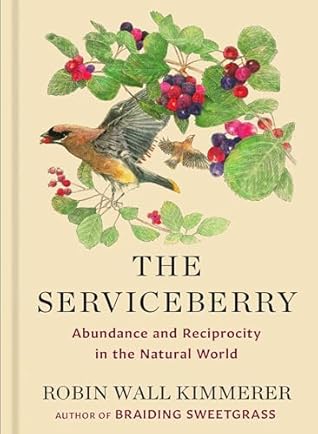More on this book
Community
Kindle Notes & Highlights
Read between
August 1 - August 1, 2025
these plant gifts are “a manifestation of unconditional love that plants have for people.” Plants offer whatever they have, to whoever needs it, “saint and sinner, alike,” he writes.
In a traditional Anishinaabe economy, the land is the source of all goods and services, which are distributed in a kind of gift exchange: one life is given in support of another. The focus is on supporting the good of the people, not only an individual. Receiving a gift from the land is coupled to attached responsibilities of sharing, respect, reciprocity, and gratitude—of which you will be reminded.
Enumerating the gifts you’ve received creates a sense of abundance, the knowing that you already have what you need. Recognizing “enoughness” is a radical act in an economy that is always urging us to consume more. Data tell the story that there are “enough” food calories on the planet for all 8 billion of us to be nourished. And yet people are starving. Imagine the outcome if we each took only enough, rather than far more than our share. The wealth and security we seem to crave could be met by sharing what we have. Ecopsychologists have shown that the practice of gratitude puts brakes on
...more
we need, in respect for the generosity of the giver. Climate catastrophe and biodiversity loss are the consequences of unrestrained taking by humans. Might cultivation of gratitude be part of the solution?
If our first response to the receipt of gifts is gratitude, then our second is reciprocity: to give a gift in return.
Why then have we permitted the dominance of economic systems that commoditize everything? That create scarcity instead of abundance, that promote accumulation rather than sharing? We’ve surrendered our values to an economic system that actively harms what we love. Our metrics of economic value like GDP count only monetary value in the marketplace, of that which can be bought and sold. There is no room in these equations for the economic value of clean air and carbon sequestration and the ineffable riches of a forest filled with birdsong. Where is the value of a butterfly whose species has
...more
This seemed like maladaptive behavior to the anthropologist, who asked again: given the uncertainty of meat in the forest, why didn’t the hunter store the meat for himself, which is what the economic system of his home culture would predict. “Store my meat? I store my meat in the belly of my brother,” replied the hunter.
When the natural world is understood as a gift instead of private property, there are ethical constraints on the accumulation of abundance that is not yours to own. Gifts are not meant to be hoarded, and thus made scarce for others, but given away, which generates sufficiency for all.
These two economic worldviews, of prosperity gained through individual accumulation and prosperity gained through sharing of the commons, underpin the history of colonization in this country. The whole enterprise of dispossession and assimilation of the original peoples was designed to eradicate the notion of land as a source of belonging and to replace it with the idea that land is nothing more than a source of belongings. This required a narrowing of the definition of well-being, from common wealth to individual wealth, from abundance to scarcity.
When human survival is threatened, compassionate acts overrule market economies. People give freely to one another, and bonds of ownership disappear when everyone pools their resources of food and labor and blankets in solidarity. When systems of governance and market economies of debt are disrupted, networks of mutual aid arise.
Know the ways of the ones who take care of you, so that you can take care of them. Introduce yourself. Be accountable as the one who comes asking for a life. Ask permission before taking. Abide by the answer. Never take the first one. Never take the last. Take only what you need. Take only that which is given. Never take more than half. Leave some for others. Harvest in a way that minimizes harm. Use it respectfully. Never waste what you have taken. Share. Give thanks for what you have been given. Give a gift in reciprocity for what you have taken. Sustain the ones who sustain you and the
...more
The Serviceberries show us another model, one based upon reciprocity rather than accumulation, where wealth and security come from the quality of our relationships, not from the illusion of self-sufficiency.
It is manufactured scarcity that I cannot accept. In order for capitalist market economies to function, there must be scarcity, and the system is designed to create scarcity where it does not actually exist.
A fellow tribal member captured my thoughts when she wrote, “If the economy requires people to consume more resources than the Earth can replenish, just to keep the whole thing from collapsing, isn’t it time for a new economy?”


